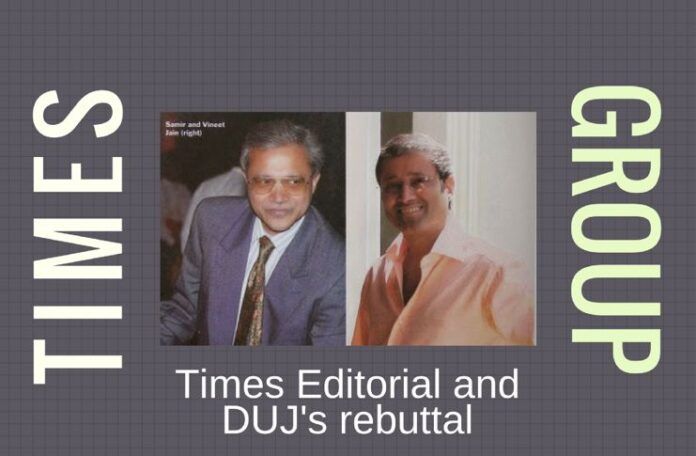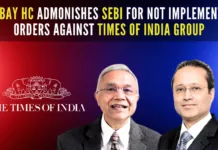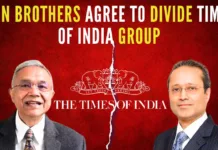
[dropcap color=”#008040″ boxed=”yes” boxed_radius=”8px” class=”” id=””]T[/dropcap]he Delhi Union of Journalists (DUJ) has come out a point by rebuttal on recent Times of India’s editorial seeking sops to newspaper industry, while arguing for free market theory in other sectors in the forthcoming Budget. Times of India on its January 19 lengthy editorial argued for various bold steps in the forthcoming Budget, seeking for a free market economy and revolutionary steps from Prime Minister Narendra Modi. In the same editorial, Times of India claimed newspaper industry and in disarray and argued for allocating many sops to the newspaper industry, propagating falsehoods on demonetization.
The Delhi Journalists Union (DUJ) came out with a detailed statement exposing the newspapers owners’ bogus claims.
The Times of India editorial basically argued that due to heavy cost on manpower newspaper industry is suffering and justifying the retrenchment in any organization.
Within two days Times of India’s owner Samir Jain and Vineet Jain got a befitting reply from the journalists’ community. The Delhi Journalists Union (DUJ) came out with a detailed statement exposing the newspapers owners’ bogus claims. The DUJ, the oldest union of journalists, which is essentially a Left leaning one revealed the total income Time Of India which is around Rs.4800 crore per annum and total salary expense comes around Rs.551 crore, which comes to only 11 percent.
[dropcap color=”#008040″ boxed=”yes” boxed_radius=”8px” class=”” id=””]T[/dropcap]he Journalists’ Union also revealed that out of the total salary expense Rs.102 crores are spent for just 40 employees of Times of India and out of which high paying staffers, just four belong to Journalism Division. This means that majority chunk of the salary in India’s largest newspaper is given to management side and not to journalists, who are supposed to get major pie.
“From a document extracted from the public record, we know that BCCL incurred salary and wage costs of Rs. 551 crore in 2010-11, on “operating revenue” of almost Rs.4,500 crore and “other income” of about Rs. 300 crore. Manpower costs in other words, amounted to just over 11 percent of total revenue for the company. Breaking down the “manpower cost” component reveals that Rs. 102 crore out of the total, i.e., close to 20 percent, is absorbed in remunerations to just 40 employees. This list of 40 includes only four whose function could be identified as journalism.
“BCCL (Times of India’s company Bennett Coleman & Co. Ltd) have taken on themselves the mission of arguing for press freedom as a public good. We call on them to make their records public and allow a full evaluation of their record of decisions that have violated the public interest,” said DUJ.
Journalists’ union also accuses Times of India to squeeze the manpower by wrong campaign on Demonetization affects.
As no newspaper is going to publish the press release of the Journalists’ Union, we are published the full text of the Union below:
DELHI UNION OF JOURNALISTS (REGD)
Flat No.29, Central Market, Connaught Place, New Delhi-1
Phone: 23413459, Email: duj.delhi@gmail.com
January 21, 2017
For favor of publication
Press Release
A Reply to The Times of India
On the eve of the budget session and state elections the newspaper industry has made out a case for financial sops, including exemptions from the forthcoming Goods and Services tax, and higher government advertisement rates. The pretext is the losses it claims it faces as a result of paying journalists and other employees fair wages. This is a case of killing two birds with one stone: make a killing by getting more money from the government and by denying employees the dues ordered by the Majithia Wage Board.
We are alarmed in this context to see the Times of India, which has set itself up as a battering ram of newspaper industry interests, seek through its editorial pages to delegitimise the wage board process which has been a vital part of the protective legislation for press freedom. We also seriously object to this continuing misuse of editorial pages in the press to argue a one-sided case for newspaper industry owners.
We wish to point out that newspaper houses are increasingly splashing out on gala events and promotions, fashion shows, beauty contests and five-star award ceremonies but are unwilling to pay their employees decent wages. Instead, they are cracking down on trade unions in the industry and resorting to large scale contract employment to bypass the Wage Board. They have even questioned the need for wage fixation machinery and the Working Journalists Act itself. By tradition the Government of India appoints a new Wage Board every ten years; it is time for the next one to be appointed but the employers refuse to honour even the previous Award.
The BJP government’s demonetisation decision of November 8, 2016, is now being misused as a pretext for cracking down on employees. We are shocked to see a number of major national newspapers and several regional players, responding with mass retrenchments of journalists and other industry workers. These retrenchments are being done in secrecy, invariably in violation of existing labour laws, in a manner that exploits the economic and financial vulnerability of workers whose livelihoods are at stake. Many of those retrenched are forced to resign and sworn to secrecy in the process, on pain of losing the measly two months’ salary they are granted as compensation.
The Times of India in its editorial page article of January 19 (“Indian newspaper industry: Red ink splashed across the bottom line”), makes a case that it is doing the readership a great favour by keeping selling price low. This goes against its boasts, propagated through its own news pages, about the affluence of its readers and their high purchasing power. It also glosses over the role it has played over the years in launching a corrosive “price war” within the newspaper industry, which has forced competition to follow suit, driven many other titles to the wall and destroyed pluralism and diversity in the press.
Managements have been pursuing profit at the cost of the integrity of the industry’s basic function of gathering news and presenting it in a credible fashion. The boom and bust cycle of the global economy has therefore impacted an industry that has in its lust for profits, chosen to depend increasingly upon advertisements, rather than seek to expand readership through quality news reporting. This does not mean that it cannot afford to pay legally mandated wages ordered by a government appointed tripartite Wage Board, headed by a retired judge, which went into the industry’s finances in great detail before ordering pay hikes. The newspaper management challenged the Justice Majithia Wage Board Award in the Supreme Court but lost. The Award has the stamp of approval of the Supreme Court. However, the majority of newspaper owners have chosen to flout the judgement and have still not paid the awarded wages, let alone arrears.
Now the Award and the notional losses caused by it are being used as an argument to get government support for the industry and shore up private profits. Media owners are feverishly lobbying for tax exemptions for newsprint which would otherwise be done away with under the impending GST regime. Media houses have thrived on this subsidy for decades. To make employees a scapegoat in this tug of war with the government is malicious and unjust.
We would draw attention to only a few instances where the Times of India seeks to mislead, contrary to the lofty purpose it embraces of educating. At some point in its spiel, it says that an (unnamed) publicly-listed newspaper company has had “revenue growth” of 4 percent compounded annually since 2011-12, while manpower costs have jumped by “over 58 percent”.
This is a deliberate effort at misleading. If the Times of India wants to make a case of unjust manpower cost escalation, it has to provide a calculation on comparable bases. In the five years since 2011-12, 4 percent compound annual growth would amount in aggregate to about 20 percent. So the comparison against the supposed 58 percent growth in manpower costs is not really as terrible as the figure of 4 versus 58 would suggest.
Secondly, we have serious reasons to question the authenticity of the figures that the Times of India presents, since the newspaper entity remains unidentified.
Thirdly, we also have reasons to doubt if the increase in manpower costs – assuming it is accurately calculated – has anything to do with the basic mission of the newspaper. We would like to see the annual report of Bennett Coleman and Co Ltd (BCCL) – publishers of the Times of India. We believe that it is imperative if the company is making a case for policy intervention, that it should adopt this element of transparency.
From a document extracted from the public record, we know that BCCL incurred salary and wage costs of Rs. 551 crore in 2010-11, on “operating revenue” of almost Rs.4,500 crore and “other income” of about Rs.300 crore. Manpower costs in other words, amounted to just over 11 percent of total revenue for the company.
Breaking down the “manpower cost” component reveals that Rs. 102 crore out of the total, i.e., close to 20 percent, is absorbed in remunerations to just 40 employees. This list of 40 includes only four whose function could be identified as journalism.
BCCL have taken on themselves the mission of arguing for press freedom as a public good.
We call on them to make their records public and allow a full evaluation of their record of decisions that have violated the public interest.
Failing that, we call on the Times of India to honour the basic rules of journalistic ethics and permit journalists’ unions the right to reply in its columns.
We also call on the newspaper industry to cease the campaign for a special policy dispensation from the Government that would be corrosive of workers’ rights. To argue for this dispensation just on the eve of crucial elections to a number of state assemblies, is to surrender the claim to independence and to further erode the public credibility of the press.
(SK Pande) (Sujata Madhok)
President General Secretary
- Prime Minister Narendra Modi: A Gujju businessman who does not invest his precious time for a losing battle - April 13, 2024
- NIA arrests two accused Shazib and Taahaa in Bengaluru’s Rameshwaram Cafe blast case from Kolkata - April 12, 2024
- National Herald scam: Adjudicating Authority upholds Rs.752 crore assets attached by ED - April 11, 2024











This is really an embarrassing moment! Every one should make make a note of the government policies on budget section on how it actually works for public growth! But people are upside down in making expenses at high level to make country degraded.
Thank you my friends, for bringing out the truth. I am a regular Subscriber of TNIE in chennai and i am shocked at the anti tirade splashes ever since demonetisation.I knew something was amiss from the filth and nonsense they are publishing.I am a suscriber from the days of Sri Ramnath Gonkaji,and seriously contemplating to withdraw my loyalty of over five decades in various parts of India. I feel happy at this age reading P.Gurus and such others followed by many distinguished People. Thank you dear journalists for speaking the truth. Warm HT and alert Sri Modiji.
I will be surprised if anybody would believe in the ethics of journalist and publications in India. But nice, modi’s demonetization has brought out the corrupt practices of these newspapers, an unexpected side effect of demonetization…
Thanks PGURUS. In this age of ‘journalistic rascals’ 🙂 … pgurus is the only news website that I rely on. Thanks for saving the little bit of honest journalism left in India. May God Bless You All.
Why Times of India’s 2010-11 revenue and expense figures quoted? Why not 2015-15?
Because that is a public document.